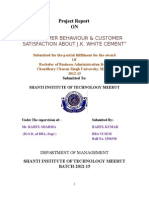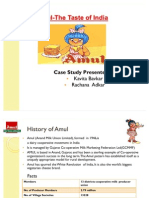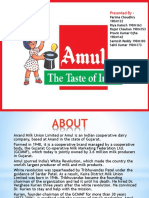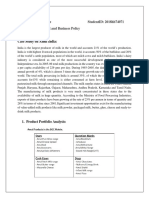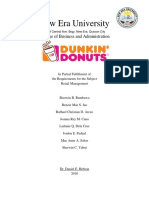0 ratings0% found this document useful (0 votes)
36 viewsHistory of Amul
History of Amul
Uploaded by
Lavkush KumarAmul was formed in 1946 as a dairy cooperative in India. It is based in Anand, Gujarat and has been highly successful, spurring India's White Revolution through its vast cooperative network. Amul utilizes a low-cost strategy and has a diverse product mix including milk, butter, cheese and more. It has strong distribution nationwide and an innovative supply chain that connects small farmers to large markets. Amul continues to leverage new technologies while maintaining its cooperative structure and affordable prices.
Copyright:
© All Rights Reserved
Available Formats
Download as PPT, PDF, TXT or read online from Scribd
History of Amul
History of Amul
Uploaded by
Lavkush Kumar0 ratings0% found this document useful (0 votes)
36 views36 pagesAmul was formed in 1946 as a dairy cooperative in India. It is based in Anand, Gujarat and has been highly successful, spurring India's White Revolution through its vast cooperative network. Amul utilizes a low-cost strategy and has a diverse product mix including milk, butter, cheese and more. It has strong distribution nationwide and an innovative supply chain that connects small farmers to large markets. Amul continues to leverage new technologies while maintaining its cooperative structure and affordable prices.
Original Description:
amul dahi
Original Title
amulppt-120626052555-phpapp01
Copyright
© © All Rights Reserved
Available Formats
PPT, PDF, TXT or read online from Scribd
Share this document
Did you find this document useful?
Is this content inappropriate?
Amul was formed in 1946 as a dairy cooperative in India. It is based in Anand, Gujarat and has been highly successful, spurring India's White Revolution through its vast cooperative network. Amul utilizes a low-cost strategy and has a diverse product mix including milk, butter, cheese and more. It has strong distribution nationwide and an innovative supply chain that connects small farmers to large markets. Amul continues to leverage new technologies while maintaining its cooperative structure and affordable prices.
Copyright:
© All Rights Reserved
Available Formats
Download as PPT, PDF, TXT or read online from Scribd
Download as ppt, pdf, or txt
0 ratings0% found this document useful (0 votes)
36 views36 pagesHistory of Amul
History of Amul
Uploaded by
Lavkush KumarAmul was formed in 1946 as a dairy cooperative in India. It is based in Anand, Gujarat and has been highly successful, spurring India's White Revolution through its vast cooperative network. Amul utilizes a low-cost strategy and has a diverse product mix including milk, butter, cheese and more. It has strong distribution nationwide and an innovative supply chain that connects small farmers to large markets. Amul continues to leverage new technologies while maintaining its cooperative structure and affordable prices.
Copyright:
© All Rights Reserved
Available Formats
Download as PPT, PDF, TXT or read online from Scribd
Download as ppt, pdf, or txt
You are on page 1of 36
History of Amul
Amul (Anand Milk Union Limited), formed in 1946,
is a dairy cooperative movement in India.
It is managed by Gujarat Co-operative Milk
Marketing Federation Ltd. (GCMMF).
AMUL is based in Anand, Gujarat and has been a
sterling example of a co-operative organization's
success in the long term. The Amul Pattern has
established itself as a uniquely appropriate model
for rural development.
Amul has spurred the White Revolution of India.
It is also the world's biggest vegetarian cheese
brand.
1
2
Success!!
Robust Supply Chain
The vast and complex supply chain
Hierarchical network of cooperatives
Stretches from small suppliers to large
fragmented markets
3
Low Cost Strategy
Amul adopted a low-cost price strategy to
make its products.
Affordable and attractive to consumers by
guaranteeing them value for money.
4
Diverse Product Mix
Amul Butter,
Milk Powder,
Ghee,
Amulspray,
Cheese,
Chocolates,
Shrikhand,
Ice cream,
Nutramul,
Milk and Amulya
5
Strong Distribution Network
Amul products are available in over 500,000
retail outlets across.
India through its network of over 3,500
distributors.
47 depots with dry and cold warehouses to
buffer inventory of the entire range of
products.
6
Technology and e-initiatives
New products
Process technology
Complementary assets to enhance milk
production
E-commerce.
7
GCMMF Over View
GCMMF: Gujarat Cooperative Milk Marketing
Federation
GCMMF is India's largest food products marketing
organization. It is a state level apex body of milk
cooperatives in Gujarat which aims to provide
remunerative returns to the farmers and also
serve the interest of consumers by providing
quality products which are good value for money.
CRISIL, India's leading Ratings, Research, Risk
and Policy Advisory company, has assigned its
highest ratings of "AAA/Stable/P1+" to the
various bank facilities of GCMMF.
8
Facts
Members: 13 district cooperative milk
producers' Union
No. of Producer Members: 2.79 million
No. of Village Societies: 13,328
Total Milk handling capacity: 11.22 million litres per day
Milk collection (Total - 2008-
09):
3.05 billion litres
Milk collection (Daily Average
2008-09):
8.4 million litres
Milk Drying Capacity: 626 Mts. per day
Cattle feed manufacturing
Capacity:
3500 Mts. per day
9
Amul - Business Model
RAW MILK
Dried
Skimmed Milk
Powder
Packaged Milk
Ice cream
Beverages
Condensed
Ghee
Butter
Cream
pasteurization
10
SWOT Analysis
11
12
Strengths
Largest food brand in India
High Quality, Low Price
World's Largest Pouched Milk Brand
Annual turnover of US $1504 million
Highly Diverse Product Mix
Robust Distribution Network
13
14
Risks of highly complex supply
chain system
Strong dependency on weak
infrastructure
Alliance with third parties who do
not belong to the organized sector
15
16
Opportunities.!
Penetrate international
markets
Diversify product portfolio to
enter new product categories
and expand existing categories
like processed foods,
chocolates etc
17
18
Competitors - Hindustan Lever, Nestle
and Britannia
Still competition from MNCs in butter
Growing price of milk and milk products
Ban on export of milk powder
19
Health Conscious
Kids
Women
Youth Calorie Conscious 20
Kids
I. Amul Kool
II. Chocolate Milk
III.Nutramul Energy
Drink
IV.Amul Kool
V. Millk Shaake
21
Womens
Amul Calci
22
Youth
I. UtterlyDelicious
Pizza
II. Amul Emmental
Cheese
III.Amul Cheese
Spreads
23
Health Conscious
I.Nutramul
II.Amul Shakti Health
Food Drink
24
Calorie Conscious
I.Amul Lite
II.Sagar Skimmed
Milk Powder
III.Amul Lite Slim
and Trim Milk
25
26
27
Milk
Ice-cream Manufacturers
Restaurant/Food Chains
Coffee Shop Chains
Temples
Butter/Cheese/Ghee
28
Bakery & Confectionaries
Pizza Retailers
Snacks Retailers
Advertisements
AMUL is well known for its innovative hoardings. Find below a
few:
29
Advertisements
30
Amul - Product Diversification
Secret Philosophy
Progressive addition of higher value products
while maintaining the desired growth in existing
products.
Amul introduced products with consistent value
addition but never left the core philosophy of
providing milk at a basic, affordable price
Seeking unfamiliar products or markets in
the pursuits of growth with both dairy and non-dairy products
31
The 3 Cs
Customer
Company
Competitor
Customers extremely satisfied
Moved from loose milk to
packaged milk
Ready to try more products
Improved socio-economic
conditions
Largest milk brand in Asia
More than 30 dairy brands
Market leader in ghee & butter
Very strong supply chain
Enjoys Fine reputation
Quality with Affordability
Defending against Mahananda,
Vijay, Milma & other co-operative
milk brands
Aggressive moves against
Britannia, Nestle, Mother Dairy
and Kwality
Amul Product Portfolio
Category Market Share Market Position
Chocolate Drink 90% 1
Butter, Ghee 85% 1
Cheese 50% 1
Sweets 50% 1
Milk Powder 40% 1
Ice-cream 24.75% 2
Chocolate 10% 3
33
Amul Product Portfolio in Graph
M
a
r
k
e
t
s
h
a
r
e
34
To improve further Amul can try out the
following ideas:
I) Amul can venture out on new products like
Toned milk, Condensed milk that can be used for
sweets, Baby food products,
II) There are certain product like Amul basundi,
gulab jamoon, choclates etc which are not as
popular as Amul ice cream. Amul must try to
understand the cause of this through thorough
market research and work on improving these
products
III) Though Amuls hoardings are a huge
success, it can penetrate even better in the rural
areas by advertising through the media viz cable
channels and newspapers. Sponsoring shows in
TV, sports events can be of great help.
What more can Amul do?
35
36
You might also like
- Future of Retail Report V1.01 PDFDocument64 pagesFuture of Retail Report V1.01 PDFTutu MosesNo ratings yet
- Consumer Buying Behavior of J.K. Whtie CementDocument111 pagesConsumer Buying Behavior of J.K. Whtie Cementlokesh_045100% (5)
- Market Structure PPT ReportDocument28 pagesMarket Structure PPT ReportMarbie Centeno OcampoNo ratings yet
- Big Data MyntraDocument27 pagesBig Data MyntraGaurav Rawat100% (1)
- Method Statement Installation of UPVC Drainage FINALDocument4 pagesMethod Statement Installation of UPVC Drainage FINALanon_31671419463% (8)
- Padini: Group Members: Akmar Hadati Jasmi Nur Hafizah Mohmad Nor Haida Marzuki Melissa ThingDocument11 pagesPadini: Group Members: Akmar Hadati Jasmi Nur Hafizah Mohmad Nor Haida Marzuki Melissa ThingMun Tajuddin0% (1)
- Tiki MarketingDocument16 pagesTiki MarketingLộc Nguyễn tài100% (1)
- Answer Key For Quiz - Inventory EstimationDocument6 pagesAnswer Key For Quiz - Inventory EstimationMelogen Labrador100% (3)
- Amul The Taste of IndiaDocument24 pagesAmul The Taste of IndiaRavi RajaniNo ratings yet
- BCGDocument60 pagesBCGManimala SamantaNo ratings yet
- AMULDocument23 pagesAMULmsy1991No ratings yet
- Amul The Taste of IndiaDocument23 pagesAmul The Taste of IndiaHarshal ParekhNo ratings yet
- Amul The Taste of IndiaDocument22 pagesAmul The Taste of Indiaamansrivastava007No ratings yet
- Amul - The Taste of IndiaDocument24 pagesAmul - The Taste of Indiaaskrulz27100% (1)
- BCG Matrix of AmulDocument60 pagesBCG Matrix of AmulseemaNo ratings yet
- Presentation 1 PPT AmulDocument15 pagesPresentation 1 PPT Amulkkkavi1230% (1)
- Amul FinalDocument20 pagesAmul FinalRajat ChauhanNo ratings yet
- Amul PPT 121128003311 Phpapp01Document36 pagesAmul PPT 121128003311 Phpapp01Ankit GargNo ratings yet
- BCG Matrix of AmulDocument60 pagesBCG Matrix of AmulAJAYNo ratings yet
- Stretegic Ppts - UploadDocument50 pagesStretegic Ppts - UploadVishal MalhotraNo ratings yet
- Brand Audit of AmulDocument19 pagesBrand Audit of AmulTanujit SahaNo ratings yet
- G2 7 Amul Case StudyDocument23 pagesG2 7 Amul Case StudyTanya Dutta100% (6)
- Presentation On: Guided By: Manish Sir Presented By: Amit Sharma Gourav JainDocument55 pagesPresentation On: Guided By: Manish Sir Presented By: Amit Sharma Gourav Jaincimr33No ratings yet
- Amul PresentationDocument15 pagesAmul PresentationPrachi AggarwalNo ratings yet
- Assignment 1: Case Study On Amul IndiaDocument10 pagesAssignment 1: Case Study On Amul IndiaShruti NagmoteNo ratings yet
- Assignment 1: Case Study On Amul IndiaDocument10 pagesAssignment 1: Case Study On Amul IndiaShruti NagmoteNo ratings yet
- Strategic Management Assignment (Amul) PDFDocument10 pagesStrategic Management Assignment (Amul) PDFShruti NagmoteNo ratings yet
- Strategic Management Assignment PDFDocument10 pagesStrategic Management Assignment PDFShruti NagmoteNo ratings yet
- Presented By:: Varun Singla MBA-859-2K10 Ymcaust, FBDDocument33 pagesPresented By:: Varun Singla MBA-859-2K10 Ymcaust, FBDKunal KapilaNo ratings yet
- Presented By:: Virendra Thanekar. Prakash Ravindran. Vishal SonawaneDocument31 pagesPresented By:: Virendra Thanekar. Prakash Ravindran. Vishal Sonawanevishalvriksh123No ratings yet
- Amul Model For MarketingDocument22 pagesAmul Model For MarketingshalinpshahNo ratings yet
- AmulDocument26 pagesAmulNiti Modi ShahNo ratings yet
- Amul - Integrated Marketing CommunicationDocument43 pagesAmul - Integrated Marketing CommunicationSagar Agarwal50% (8)
- Presented By:: AMUL: Truly The Taste of IndiaDocument25 pagesPresented By:: AMUL: Truly The Taste of Indiashankar112100% (1)
- Case Study - Amul's MKTG StrategyDocument26 pagesCase Study - Amul's MKTG StrategyAshish TagadeNo ratings yet
- Amul (Anand Milk Union Limited) : Presented By: Jyothi.B Swati Jain Vishakha JhaveriDocument50 pagesAmul (Anand Milk Union Limited) : Presented By: Jyothi.B Swati Jain Vishakha JhaverisagarshettyNo ratings yet
- AmulDocument26 pagesAmulsundalvi048839No ratings yet
- BHBHJDocument53 pagesBHBHJJohn MakanziNo ratings yet
- AmulDocument14 pagesAmulKunal KimatkarNo ratings yet
- Development of Food Processing IndustryDocument24 pagesDevelopment of Food Processing IndustryTanya KohliNo ratings yet
- SwotDocument15 pagesSwotManali RedkarNo ratings yet
- Amul FinalDocument8 pagesAmul FinalkhushitmehtaNo ratings yet
- Marketing Strategy of AMULDocument27 pagesMarketing Strategy of AMULTanya KohliNo ratings yet
- MKTRDocument17 pagesMKTRSanjeeta KumariNo ratings yet
- AmulDocument28 pagesAmulAnkit JaniNo ratings yet
- AMUL's Marketing Plan: Prepared By-Qasim Abbas Rizvi Rishabh PandeyDocument26 pagesAMUL's Marketing Plan: Prepared By-Qasim Abbas Rizvi Rishabh PandeyRishabh PandeyNo ratings yet
- Marketing Strategy of AMULDocument26 pagesMarketing Strategy of AMULRahul DawarNo ratings yet
- Presented byDocument32 pagesPresented byArshan AlviNo ratings yet
- Amul Supply Chain ReportDocument21 pagesAmul Supply Chain ReportChirag PandyaNo ratings yet
- AmulDocument50 pagesAmulAnjana BaruahNo ratings yet
- Rural Marketing: BY: - Saurabh DabarDocument28 pagesRural Marketing: BY: - Saurabh DabarNeha GhaiNo ratings yet
- AmulDocument41 pagesAmulParag MaheshwariNo ratings yet
- SBM TPDocument16 pagesSBM TPNathanael WelchNo ratings yet
- Strategic Management AMULDocument12 pagesStrategic Management AMULkomal soniNo ratings yet
- Ed AmulDocument18 pagesEd AmulIron ManNo ratings yet
- Amul Sip ProposalDocument15 pagesAmul Sip ProposalRakesh MishraNo ratings yet
- BCG Matrix of AmulDocument23 pagesBCG Matrix of AmulAlonnyNo ratings yet
- Amul - The Taste of IndiaDocument16 pagesAmul - The Taste of IndiaBhavNo ratings yet
- Reinvent Your Dairy at Home - Your Ultimate Guide to Being Healthier Without LactoseFrom EverandReinvent Your Dairy at Home - Your Ultimate Guide to Being Healthier Without LactoseNo ratings yet
- Building Brand Equity: The Importance, Examples & How to Measure ItFrom EverandBuilding Brand Equity: The Importance, Examples & How to Measure ItNo ratings yet
- Producing Cream on the Dairy Farm - A Collection of Articles on the Methods, Science and Equipment Used in Cream ProductionFrom EverandProducing Cream on the Dairy Farm - A Collection of Articles on the Methods, Science and Equipment Used in Cream ProductionNo ratings yet
- Micro or Small Goat Entrepreneurship Development in IndiaFrom EverandMicro or Small Goat Entrepreneurship Development in IndiaNo ratings yet
- Augmentation of Productivity of Micro or Small Goat Entrepreneurship through Adaptation of Sustainable Practices and Advanced Marketing Management Strategies to Double the Farmer’s IncomeFrom EverandAugmentation of Productivity of Micro or Small Goat Entrepreneurship through Adaptation of Sustainable Practices and Advanced Marketing Management Strategies to Double the Farmer’s IncomeNo ratings yet
- Emerging Dairy Processing Technologies: Opportunities for the Dairy IndustryFrom EverandEmerging Dairy Processing Technologies: Opportunities for the Dairy IndustryNo ratings yet
- Fashion Jewelry SpainDocument3 pagesFashion Jewelry SpainprashantgoelNo ratings yet
- 11 Business Studies Notes ch10 Internal Trade 02 PDFDocument11 pages11 Business Studies Notes ch10 Internal Trade 02 PDFPetrishiya wiggetNo ratings yet
- Macro Micro FactorsDocument6 pagesMacro Micro FactorsadillawaNo ratings yet
- DBMS (Database Management System)Document9 pagesDBMS (Database Management System)zohiruddin hashimNo ratings yet
- BATA Annual Report 2014Document136 pagesBATA Annual Report 2014mia mailiyani50% (2)
- Bep ProblemsDocument5 pagesBep ProblemsvamsibuNo ratings yet
- Profit and Loss AlaminDocument31 pagesProfit and Loss AlaminMd. Nafis KhanNo ratings yet
- The Way To Think QualityDocument14 pagesThe Way To Think QualitybhalhotraNo ratings yet
- Fu RVFi 7 Sob C3 Ty X0Document8 pagesFu RVFi 7 Sob C3 Ty X0Hari Om MishraNo ratings yet
- ITCD Assignment 1Document4 pagesITCD Assignment 1Sana SaraNo ratings yet
- Segmentation of Industrial Markets - Nested ApproachDocument35 pagesSegmentation of Industrial Markets - Nested ApproachSana Sadiq100% (1)
- Rural MarketingDocument25 pagesRural Marketingbls.chitra6152No ratings yet
- Kempal Construction and Supply Corporation 200-105-729-0000 Summary of Sales For The Year 2020Document162 pagesKempal Construction and Supply Corporation 200-105-729-0000 Summary of Sales For The Year 2020Pajarillo Kathy AnnNo ratings yet
- Wal-Mart's Operations ManagementDocument6 pagesWal-Mart's Operations ManagementMithilesh WaghmareNo ratings yet
- Mba MarketingDocument2 pagesMba MarketingSuryanarayana Murthy YamijalaNo ratings yet
- Supply Chain Management and Marketing ChannelsDocument32 pagesSupply Chain Management and Marketing ChannelsMarcyNo ratings yet
- PA - #Chapter3 Price Action Trading SecretsDocument7 pagesPA - #Chapter3 Price Action Trading SecretsskotteNo ratings yet
- New Era University: College of Business and AdministrationDocument53 pagesNew Era University: College of Business and AdministrationRenzie Mae JaoNo ratings yet
- Wrong Targeting Renders Strategy IneffectiveDocument5 pagesWrong Targeting Renders Strategy IneffectiveEmelia D' SilvaNo ratings yet
- Robin Miah (Summary)Document2 pagesRobin Miah (Summary)Awais Muzaffar AliNo ratings yet
- Habitual Difference in Fashion Behavior of Female College Students Between Japan and ThailandDocument8 pagesHabitual Difference in Fashion Behavior of Female College Students Between Japan and ThailandLudoșanu AndreeaNo ratings yet
- To Study The Growth of Retail Sector in India: A Case of Big BazaarDocument45 pagesTo Study The Growth of Retail Sector in India: A Case of Big BazaarNaman JainNo ratings yet

